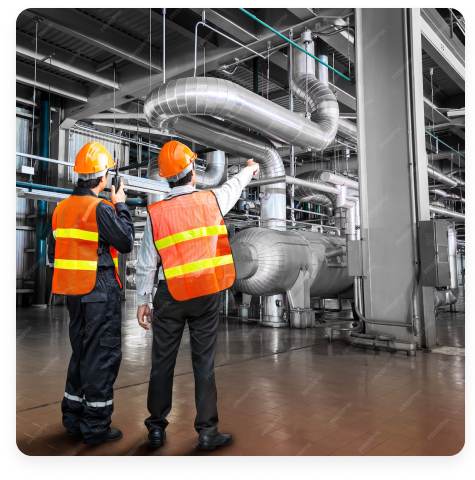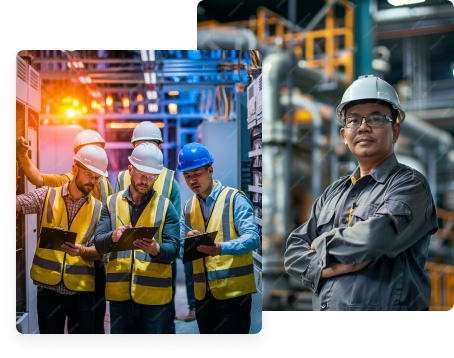ASME PCC-2 Repair of Pressure Equipment
Strengthen pressure equipment reliability and master repair techniques with our in-depth ASME PCC-2 training. Malaysia & Indonesia based 5-day course.
Level
Intermediate
Type
Facetoface

Trusted by Leading Companies
Our training programs are promoted to engineers, supervisors, and technical teams across the globe, supporting their continuous development and operational competency.












About Training
ASME PCC-2, being a relatively new standard and fairly popular, has proved to be useful worldwide for the repair of pressure equipment and piping.
Many large companies have adopted these procedures and incorporated them into their company specifications.
The intent behind this 3-day training program is to introduce this standard to all attendees and understand all the basic concepts and philosophy, as well as the various procedures for repairing pressure equipment and piping.
In the training course, we also will discuss the limitations and advantages/ disadvantages of all the procedures mentioned in the standard.
The correlation of this standard with other in-service codes and standards such as API-510/ 570/ 579/ 580 will also be understood and clarified to all attendees.
This training course will not only be useful to maintenance engineers but equally for all supporting disciplines such as design, operations, and inspection engineers.
It will help all engineers to collectively troubleshoot and resolve problems/ issues at the site related to temporary/ permanent repairs of equipment and piping.
Training Objectives
What is ASME PCC-2 training course objective?
PetroSync aims to provide participants with a thorough understanding of the ASME Post Construction Committee-2 (PCC-2) standard and its application in the field of repairs of pressure equipment. The complete objectives are mentioned as follows:
- Familiarize participants with the concepts and technical terms of the standard
- Know the basic concepts of the standard and their design fundamentals
- Troubleshoot to resolve various in-service issues.
- Know the design philosophy of pressure parts
- Understand the in-service problems in pressure equipment and piping
- Learn the maintenance aspects of this equipment.
- Get introduced to all the repair techniques. (temporary and permanent)
- Discover the fabrication requirements, assembly, and welding requirements.
- NDT and testing procedures for repaired equipment and piping
Audiences
Who should join ASME PCC-2 training course by PetroSync?
ASME PCC-2 training course by PetroSync is designed for, but not limited to maintenance engineers, and design, operations, and inspection professionals who are involved in equipment such as pressure vessels, heat exchangers, process columns, drums, piping, etc.- Design Engineers / Managers
- Mechanical Engineers / Managers
- Maintenance Engineers / Managers
- QAQC Engineers / Managers
- Inspection Engineers / Managers
- Reliability Engineers / Managers
Instructor
MM
Mandar Mulay
Mandar Mulay has about 20 years hands on experience in design and integrity assessment of Piping Systems, Reactors & Storage Tanks, Pressure Vessels, Power Boiler, and Heat Exchanger. He is well conversant with the major industry codes & standards such as ASME Sec. I, ASME B 31.1, B31.3 , B31.4 and B31.8, ASME Sec VIII, BS-5500, TEMA, API -650, IS 803, API 579, ASME PCC-2 etc.
Major projects closely associated with, in his professional career so far are, Qatar Chemicals, Shell, Castrol India, Reliance Industries, Cargill Foods USA, etc. His proficiency in Power Boiler, Piping and Pressure Vessel Codes enables him to trace the similarities and differences of these codes. He also actively involved as Instructor for programs on the subjects of ASME codes, Integrity Assessment, Fitness for Service, etc.
Along with his career in Engineering and Design Department in a multinational company at a very senior post for the last 20 years, he is also visiting faculty to a well known Engineering College in India for their P.G. Courses in Piping Design and Engineering
Apart from being visiting faculty, He has also conducted several Training Courses ( ASME Sec. I, ASME Sec. VIII, ASME B 31.3 Piping Codes , API 579 FFS code, ASME PCC-2 Repair practices, and Heat Exchanger Design Operations & Maintenance ) in Saudi Arabia, Qatar, Bahrain and UAE for engineers from companies like Saudi Aramco, SABIC group of Companies, Qatar Petroleum, ADNOC, BAPCO, DEWA, Gulf Petrochemicals etc. He has already conducted many times the training courses in API 579, where the participants rated him “Excellent” for these courses.
Daily Aims
- Introduction and Overview of ASME PCC-2
- Scope, Organization, and Intent
- Applicability and limitations of repair methods covered by ASME PCC-2
- Choosing correct repair technique for given defects
- Detailed Repair methods and Inspection techniques
- Welded Repairs
- Butt-Welded Insert Plates in Pressure Components
- Repair procedure and NDT of insert plate repair
- Weld Overlay to Repair Internal Thinning
- Pre-qualified repairs
- Burst testing method
- Welded Leak Box Repair
- Fabrication of Welded box
- Examination and testing
- Full Encirclement Steel Reinforcing Sleeves for Piping
- Type A and Type B sleeves and their applicability
- Weld Buildup, Weld Overlay, and Clad Restoration
- Examination and Testing
- Fillet Welded Patches
- Alternatives to Postweld Heat Treatment
- Alternatives to Traditional Welding Preheat
- Threaded or Welded Plug Repairs
- Flaw Excavation and Weld Repair
- Mechanical Repairs (Non-welding repairs)
- Mechanical Clamp Repair
- Freeze Plugs
- Damaged Threads in Tapped Holes
- Inspection and Repair of Shell and Tube Heat Exchangers
- Inspection Tube count
- Tube plugging
- Mechanical Plug
- Friction Plugs
- Examination and Testing
- Hot bolting
- Half Bolting
- Flange Repair and Conversion
- Pipe Straightening or Alignment Bending
- Pressure and Tightness Testing of Piping and Equipment
- Pneumatic Testing-Do’s and Don’ts
- Nondestructive Examination in Lieu of Pressure Testing for Repairs and Alterations
- Relevance of ASME PCC-2 Standard with API 510 and API 570 Codes
- 8 Nos of case studies/ exercise demonstrating use of every importanttopic from the standard. (relevant case study will be taken up after completion of the chapter daily)
Training Schedule
| Code | Start Date | End Date | Locations | Cost | Instructor |
|---|---|---|---|---|---|
| PST0399-202601 | 24 Jun, 2026 | 26 Jun, 2026 | Kuala Lumpur, Malaysia | USD 3095 | Mandar Mulay |
| PST0399-202602 | 05 Aug, 2026 | 07 Aug, 2026 | Bandung, Indonesia | USD 3095 | Mandar Mulay |
| PST0399-202603 | 18 Nov, 2026 | 20 Nov, 2026 | Kuala Lumpur, Malaysia | USD 3095 | Mandar Mulay |
| PST0399-202604 | 09 Dec, 2026 | 11 Dec, 2026 | Bali, Indonesia | USD 3295 | Mandar Mulay |
Why Choose This Training
Credibility
Align with API/ASME standards. Trusted by major operators.
Expert Instructors
Led by industry veterans with real field experience.
Real Case Studies
Practical application of concepts through real world scenarios.
Practical Skills
Hands on calculations and decision making for FFS outcomes.
Trusted by Operators
Delivered to Aramco, ADNOC, SABIC, and other major operators.
Global Training Standard
Recognized across major industries by PetroSync's proven approach.
Professional Training Aligned with Industry Standards
Practical, industry ready training designed for real work environments
Limited seats available

Frequently Asked Questions
-
Direct Transfer
PetroSync Global Pte Ltd Bank Details:
- Account Name: PetroSync Global Pte Ltd
- Bank Name: DBS Bank Ltd
- Bank Code: 7171
- Bank Swift Code: DBSSSGSGXXX
- Branch Code: 288
- Account No: 0288-002682-01-6-022 (USD)
- Bank Address: 12 Marina Boulevard, Level 3, Marina Bay Financial Centre Tower 3, Singapore 018982
-
Terms & Conditions:
- For payment via direct telegraphic transfer, clients must bear both local and overseas bank charges.
-
Credit Card:
Terms & Conditions:
- A 4% credit card processing fee applies for credit card payments.
- Delegates who cancel after the training has been officially confirmed via email are required to pay the full course fee, and no refunds will be granted. However, you may substitute delegates at any time as long as reasonable advance notice is given to PetroSync.
- If PetroSync cancels, postpones, changes the trainer, or alters the training location (classroom/virtual) for any reason, and the delegate is unable or unwilling to attend on the rescheduled date, a 100% credit voucher of the paid contract fee will be issued. This credit voucher can be used for another PetroSync training program, subject to mutual agreement, within one year from the postponement date.
- PetroSync is not responsible for any loss or damage resulting from the cancellation policy and assumes no liability if the event is canceled, rescheduled, or postponed due to force majeure (e.g., natural disasters, war, government actions, industrial actions).
If PetroSync cancels, postpones, changes the trainer, or alters the training location (classroom/virtual) for any reason, and the delegate is unable or unwilling to attend on the rescheduled date, a 100% credit voucher of the paid contract fee will be issued. This credit voucher can be used for another PetroSync training program, subject to mutual agreement, within one year from the postponement date.
Yes, participants who complete the training will receive either an attendance certificate or a completion certificate, depending on the course requirements.
Yes, PetroSync courses adhere to international standards , with expert instructors in fields such as API, ASME, Reliability, and Drilling & Well Engineering.
Yes, PetroSync certificates are widely recognized and can be used to fulfill professional development and certification requirements across various industries.
Yes, PetroSync offers customized training programs tailored to your organization's specific needs (In-house Training).
Participants will receive comprehensive training materials , including slides, handouts, and direct learning from experts with case studies related to the training topic.
PetroSync trainers are industry experts with extensive experience as instructors and consultants in their respective fields, providing professional training with a strong background in the industry.
Yes, trainer profiles, including their qualifications, experience, and expertise, are available on the website: https://www.petrosync.com/training/.
Online training sessions are conducted via user-friendly platforms such as Zoom Premium.
To access PetroSync Online Training, participants need:
- A computer or laptop (tablets or smartphones are not recommended)
- A reliable broadband internet connection (minimum 4 Mbps)
- A webcam and a headset
- Any internet browser (Chrome browser recommended for a better experience)
- A reasonably quiet place
Yes, PetroSync provides live Q&A sessions with instructors to address real-world challenges encountered during training.
The average number of participants varies depending on the topic and participants’ schedules.
- The information you provide will be safeguarded by PetroSync and may be used to keep you informed of relevant products and services.
- As an international group, we may transfer your data globally for the purposes indicated above.
- If you do not wish to share your information with other reputable companies, please tick the box on the registration form.
Please fill out the form on the designated page first. Our team will reach out to you within a maximum of 2x24 hours.
The latest training schedule is available on the website: https://www.petrosync.com/training/.
